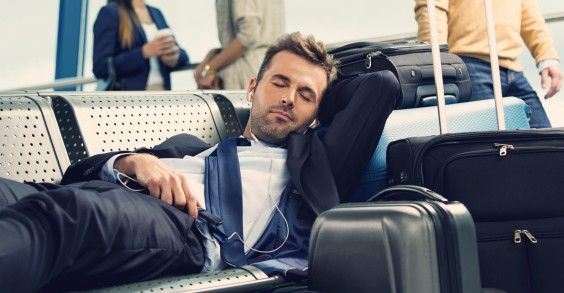There are times in life when we must find a way to sleep somewhere…unusual. Whether it’s the middle seat on a transcontinental flight, a friend’s lumpy couch, or even your office parking lot, sometimes we need to drift off in some pretty bizarre places. Read on for 16 totally doable (and actually effective) tips to help you get quality shut-eye absolutely anywhere.
Traveling
Try a layover lie-down.
Even if only for a few minutes, lying down at the airport can help trick the mind into understanding it’s sleepy time. Once on the plane, get that nap on.
Stay hydrated.
Chug plenty of H2O to avoid waking up parched at 3 a.m., especially after flying or drinking alcohol (two major causes of dehydration).
Breathe easy.
High altitudes and allergies are a one-two punch when it comes to travel congestion. Take preventative measures, such as over-the-counter decongestants or using nasal saline, to open up your nasal breathing passageways. This will help alleviate sinus problems which can keep you up at night.
Don’t dress to impress.
There’s no need to look fly when flying. An overnight flight (or bus ride, or train ride) is no time for sitting pretty. Dress for bed, since the idea is to actually go to bed, right?
On Vacation
Keep up a routine.
Hooray for circadian rhythms! Even when you hit the road (Jack), stick to a standard bedtime routine and the cues will tell your body when it’s time to chill out. To show jet lag who’s boss, stay awake until a normal bedtime (i.e. 11 p.m.) and get up at a reasonable hour. And avoid wacky napping: If your usual routine doesn’t involve lounging on the beach and taking a two-hour siesta, don’t be surprised if it’s harder to snooze at night.
Exercise as usual.
Increasing or decreasing activity levels can throw off the body’s usual energy levels—and the same goes for the time of day when you work out. Try to stick to the normal workout schedule too.
Stick with familiar foods.
Avoid unusual (i.e. spicy or just plain unrecognizable) foods on vacation. Heartburn is the mildest of the potential gastrointestinal repercussions—we won’t go into any further detail. Be especially wary of tap water in other countries. The bathroom floor is not the most ideal resting place.
Don’t overeat.
A very full stomach plus a horizontal position is a recipe for acid reflux. Which, unsurprisingly, can prevent restful slumber.
Ease up on the booze.
On vacation, an extra drink or two is a natural part of unwinding, but don’t let an umbrella-clad beverage prevent good sleep. Alcohol can interrupt natural sleep patterns, so quit boozing several hours before bedtime.
Avoid unfamiliar drugs.
Don’t try a new sleep aid (or any med for that matter) on day one of the trip of a lifetime. Unexpected side effects could affect sleep for the entirety of that grand European tour.
At a Friend’s House or a Hotel
Couch crash like a pro.
If it’s a pre-planned slumber party, BYOPJ (bring your own pajamas). If you forget, ask your host for a blanket, appropriate sleep attire, a pillow, or anything else necessary to get snoozing. Being just a smidge uncomfortable can make sleep pretty hard to come by.
Cool it.
Research suggests 60 to 68 degrees is optimal for sleep, since it lowers the core body temperature and lulls us to slumber. No A/C? Crack a window to catch a breeze.
Tune out the noise.
Strange sounds—even “soothing” white noise, if it’s not the norm—can seriously hamper your ability to sleep. Use earplugs or headphones to mimic your ideal sleep situation at home or away. Or check out some apps that offer background noise to induce sleep.
At the Office
Block out the light.
Why won’t that jerk of a cube mate turn off his desk lamp? Make like a Boy Scout and be prepared with an eye mask to cut the brightness, even when those overhead fluorescents are attempting to disturb sleep.
Get cozy.
If an intense deadline means sleep loss, head to the parking lot and the comfort of the backseat for a quick nap. Bring a grown-up security blanket (sweater/pillow/blanket) to tell the body it’s naptime.
Try paradoxical relaxation.
Like savasana in yoga, paradoxical relaxation focuses on relaxing one body part at a time and could help the body slow down and relax—especially if you’re trying to sneak in a quick nap between other tasks.
Still struggling? Here are some more tactics to try when you just can’t sleep.
This article was originally published in March 2012 and updated in March 2015.

